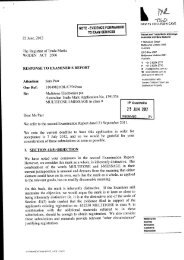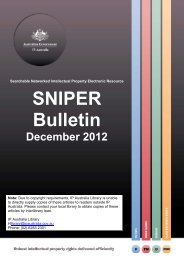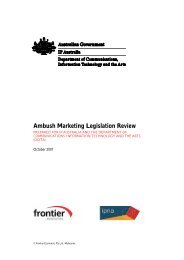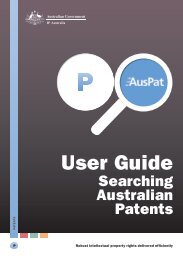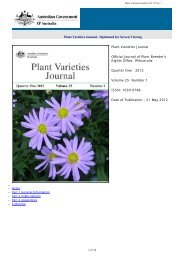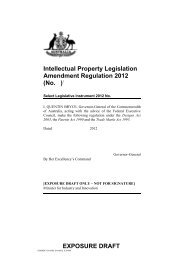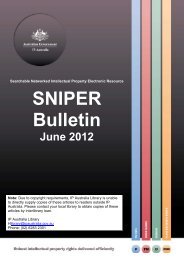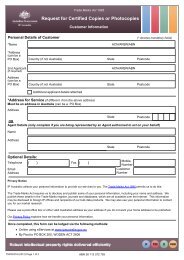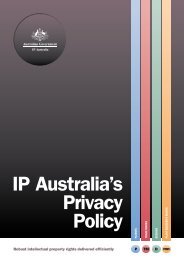64. Volume 10- Number 2 - IP Australia
64. Volume 10- Number 2 - IP Australia
64. Volume 10- Number 2 - IP Australia
You also want an ePaper? Increase the reach of your titles
YUMPU automatically turns print PDFs into web optimized ePapers that Google loves.
PLANT VARIETIES JOURNAL 1997 VOL <strong>10</strong> NO. 2<br />
Contributed articles may not necessarily represent the<br />
position, policy or procedures of the PBR office.<br />
NEGOTIATING PBR LICENCES –<br />
THINGS NOT TO DO<br />
by Edwina Menzies and Jamie Wodetzki of Minter Ellison<br />
When negotiating a PBR licence there are a number of traps<br />
to watch out for. In this article, we look at some of the<br />
things you should avoid doing.<br />
• Don’t make wild overstatements<br />
In the course of any negotiations, there is always a<br />
temptation to give a glowing description of the product you<br />
are selling. However, you need to be careful not to overstate<br />
the qualities and performance of the product. This applies to<br />
plant varieties in the same way as to any other product.<br />
Under section 52 of the Commonwealth Trade Practices Act<br />
(and similar State legislation), businesses are not permitted<br />
to engage in misleading or deceptive conduct. It is<br />
important, therefore, that you don’t say misleading or<br />
deceptive things about a variety when negotiating a PBR<br />
licence agreement. If a licensee takes out a PBR licence on<br />
the basis of misleading statements about the qualities or<br />
performance of the variety, they may be able to get out of<br />
the agreement and make a claim for damages. So, no matter<br />
how tempting it may be, don’t make claims about the<br />
growth rate, size, yield, hardiness or any other<br />
characteristics or qualities of a variety unless you are very<br />
confident about backing those claims up. Wild<br />
overstatements could come back to haunt you.<br />
Prospective licensees may also ask you (as licensor) to<br />
include in the licence agreement certain warranties about<br />
the qualities and performance of the plant. If, for example,<br />
you claimed that the variety of tree in which you own PBR<br />
produces larger fruit more quickly than any other tree on the<br />
market, you may be asked to give a warranty to that effect<br />
in the licence agreement. You need to tread very carefully<br />
when giving warranties like this. If the tree fails to live up<br />
to the warranty, you will be in breach of the agreement and<br />
may be liable for any losses suffered by the licensor as a<br />
result of that breach. Don’t give warranties you can’t live up<br />
to.<br />
• Don’t impose unreasonable restrictions<br />
Another trap to steer clear of is the inclusion of<br />
unreasonable, restrictive and anti-competitive conditions in<br />
a PBR licence agreement. Licences that impose<br />
unreasonable restrictions on the licensee could fall foul of<br />
the Trade Practices Act or the PBR Act itself.<br />
Don’t push licensees into acquiring third party goods or<br />
services as a condition of granting the PBR licence. For<br />
example, don’t insist that a particular company be<br />
contracted to tend and manage a plantation. This practice is<br />
known as 3rd line forcing and is prohibited under section 47<br />
of the Trade Practices Act.<br />
Don’t try to set minimum prices below which the licensee<br />
is not allowed to sell. Even if you make it known, induce or<br />
attempt to induce a minimum price level for resale of the<br />
variety, that will be contrary to the resale price maintenance<br />
prohibition under section 48 of the Trade Practices Act.<br />
There are large financial penalties for engaging in 3rd line<br />
forcing and resale price maintenance.<br />
Don’t limit supply to an extent that reasonable public access<br />
to the variety is denied. Under section 19 of the PBR Act<br />
1994, the grantee of PBR must take all reasonable steps to<br />
ensure reasonable public access to the variety. If<br />
propagating material of reasonable quality is not available<br />
at reasonable prices and in sufficient quantities to meet<br />
demand, a person could apply to the Secretary of the<br />
Department for a compulsory licence of PBR. In these<br />
circumstances, the PBR owner risks losing control of the<br />
terms of the licence. To avoid this risk, you should try not<br />
to refuse reasonable requests for PBR licences.<br />
There are other things to watch out for, but these are some<br />
of the more important things not to do when negotiating a<br />
PBR licence.<br />
Important Changes<br />
Current PBR Forms<br />
The official forms for PBR purposes are periodically updated. A list of current PBR forms with their numbers and date of last<br />
update is given below. When a form is updated, the month and the year of the last update follows the form number within<br />
parentheses. For example, Form P1 was last updated in July 1996 and therefore this form gets a designation of Form P1 (7/96).<br />
We encourage you to use the latest version of the forms. If you do not have the latest updated version of the form(s) you want<br />
to use, please contact the PBR office to obtain them.<br />
Name of Form Form <strong>Number</strong> Last Updated<br />
Application for Plant Breeders Rights Form P1 July 1996<br />
Part 1 – General Information<br />
Application for Plant Breeders Rights Form P2 September 1996<br />
Part 2 – Description of New Variety<br />
Nomination of a Qualified Person Form QP 1 October 1996<br />
Certification by a Qualified Person From QP 2 September 1994<br />
4



